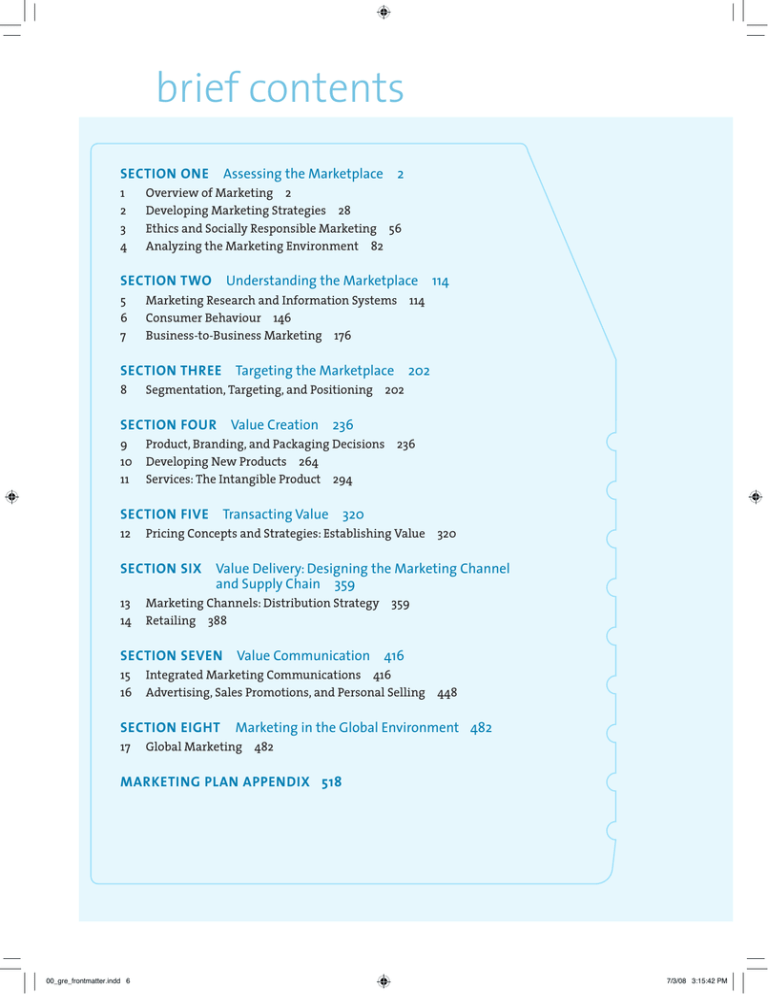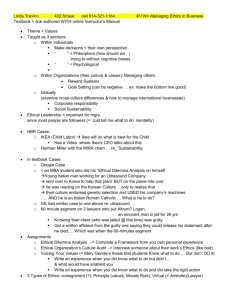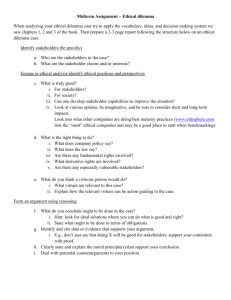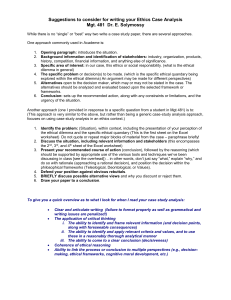brief contents SECTION ONE
advertisement

brief contents SECTION ONE Assessing the Marketplace 2 1 2 3 4 Overview of Marketing 2 Developing Marketing Strategies 28 Ethics and Socially Responsible Marketing 56 Analyzing the Marketing Environment 82 Section Two Understanding the Marketplace 114 5 6 7 Marketing Research and Information Systems 114 Consumer Behaviour 146 Business-to-Business Marketing 176 Section Three Targeting the Marketplace 202 8 Segmentation, Targeting, and Positioning 202 Section Four Value Creation 236 9 Product, Branding, and Packaging Decisions 236 10 Developing New Products 264 11 Services: The Intangible Product 294 Section Five Transacting Value 320 12 Pricing Concepts and Strategies: Establishing Value 320 Section Six Value Delivery: Designing the Marketing Channel and Supply Chain 359 13 Marketing Channels: Distribution Strategy 359 14 Retailing 388 Section Seven Value Communication 416 15 Integrated Marketing Communications 416 16 Advertising, Sales Promotions, and Personal Selling 448 SECTION EIGHT Marketing in the Global Environment 482 17 Global Marketing 482 Marketing Plan Appendix 518 vi 00_gre_frontmatter.indd 6 7/3/08 3:15:42 PM table of contents Section ONE Assessing the Marketplace 2 1 Overview of Marketing 2 What Is Marketing? 5 Marketing is about Satisfying Customer Needs and Wants 6 Marketing Entails Value Exchange 7 Marketing Requires Product, Price, Place, and Promotion Decisions 8 Marketing is Shaped by Forces and Players External to the Firm 11 Marketing Can Be Performed by Both Individuals and Organizations 12 Marketing Occurs in Many Settings 12 Marketing Helps Create Value 13 Adding Value 1.1: Bottled Water: Commodity or Super Premium? 15 What Is Value-Based Marketing? 16 How Firms Compete on the Basis of Value 16 How Do Firms Become Value Driven? 16 Why Is Marketing Important? 18 Entrepreneurial Marketing 1.1: ImaSight—Get Clear 19 Marketing Expands Firms’ Global Presence 19 Marketing is Pervasive across the Organization 20 Marketing is Pervasive across the Supply Chain 21 Marketing Makes Life Easier and Provides Career Opportunities 22 Marketing Enriches Society 22 Marketing Can Be Entrepreneurial 22 Learning Objectives Review 24 Key Terms 25 Concept Review 25 Marketing Applications 25 Net Savvy 26 Chapter Case Study: eBay: Creating Value in the Marketplace 26 2 Developing Marketing Strategies 28 Levels of Strategic Planning in Corporations 31 The Strategic Marketing Planning Process 32 Step 1: Define the Business Mission 33 Step 2: Conduct a Situation Analysis Using SWOT 35 Step 3: Identify and Evaluate Opportunities Using STP (Segmentation, Targeting, and Positioning) 36 Develop Marketing Mix 37 Internet Marketing 2.1: Lee Valley Tools Ltd.—Delivering Value through Integrated Channels 40 Step 4: Implement the Marketing Mix: Allocating Resources 41 Ethical Dilemma 2.1: LuLulemon: Bare It All, Even If You Don’t Want To! 41 Boston Consulting Group’s Portfolio Analysis 42 Step 5: Evaluate Performance and Make Adjustments 44 Strategic Planning is Not Sequential 44 00_gre_frontmatter.indd 7 vii 7/3/08 3:15:42 PM Growth Strategies 44 Market Penetration Market Development 45 45 Product Development Diversification Macro Strategies 46 46 46 Customer Excellence 46 Entrepreneurial Marketing 2.1: kicking horse Coffee—kicking ass! Customer Service 49 Operational Excellence 49 adding value 2.1: Customer Service at virgin atlantic Product Excellence 50 Learning Objectives Review Key Terms 53 Concept Review 53 Marketing Applications Toolkit 54 Net Savvy 47 50 52 53 54 Chapter Case Study: Toronto Football Club: Rebirth to Excitement 54 3 EthicsandSociallyResponsibleMarketing 56 The Scope of Marketing Ethics 60 Ethical Issues Associated with Marketing Decisions Creating an Ethical Climate in the Workplace The Influence of Personal Ethics 63 60 61 The Link between Ethics and Corporate Social Responsibility 64 adding value 3.1: aldO Fights aIdS Globally—hear No Evil, See No Evil, and Speak No Evil 66 A Framework for Ethical Decision Making Step 1: Identify Issues 67 67 Step 2: Gather Information and Identify Stakeholders Step 3: Brainstorm Alternatives 68 Step 4: Choose a Course of Action 68 Integrating Ethics into Marketing Strategy Planning Phase 69 Implementation Phase 67 69 70 Ethical dilemma 3.1: Traffic light labelling—Bucking the Obesity Trend Entrepreneurial Marketing 3.1: Fetzer vineyards’ Mission Is win–win Control Phase 73 Understanding Ethics Using Scenarios 72 71 73 Internet Marketing 3.1: Turnitin.com—Plagiarism Prevention or Copyright Infringement? 74 Scenario 1: Who is on the Line? 74 Scenario 2: Giving Credit Where Credit isn’t Due 75 viii 00_gre_frontmatter.indd 8 7/3/08 3:15:44 PM Scenario 3: The Jeweller’s Tarnished Image Scenario 4: No Wonder It’s So Good 76 Scenario 5: Bright Baby’s Bright Idea 76 Consumerism, Ethics, and Social Responsibility Ethical and Social Criticisms of Marketing Learning Objectives Review Key Terms 76 77 78 79 Concept Review 79 Marketing Applications Net Savvy 75 79 80 Chapter Case Study: How Big Is Your Footprint? 80 4 AnalyzingtheMarketingEnvironment 82 A Marketing Environment Analysis Framework 84 Successfully Leveraging Company Capabilities Building Relationships with Corporate Partners 85 86 adding value 4.1: Toyota and a little help from Its Friends 86 Macroenvironmental Factors 86 Entrepreneurial Marketing 4.1: dussault Custom Ink— Meshing rock and hip hop! 87 Competitors 88 Demographics 89 Social and Cultural Trends Technological Advances Economic Situation 95 99 100 Internet Marketing 4.1: voice over Internet Protocol— a world of Possibilities? 101 Political/Regulatory Environment Scenario Planning 102 103 Ethical dilemma 4.1: Payday loans—valuable Service or Predatory lenders? 104 Step 1: Assess Strengths and Weaknesses 104 Step 2: Assess Opportunities and Threats 106 Step 3: Identify Different Scenarios 106 Step 4: Apply the Marketing Mix to the Different Scenarios Step 5: Assess the Profitability of Each Scenario Learning Objectives Review Key Terms 108 109 Concept Review 109 Marketing Applications Net Savvy 107 107 109 110 Chapter Case Study: Simply Audiobooks: Changing the Way We Read Books 110 ix 00_gre_frontmatter.indd 9 7/3/08 3:15:45 PM SECTION TwO Understanding the Marketplace 114 5 MarketingResearchandInformationSystems 114 Using Marketing Information Systems to Create Better Value 118 The Ethics of Using Customer Information 119 The Marketing Research Process 120 Step 1: Define the Problem and Objectives 121 Step 2: Design the Research Project 122 adding value 5.1: leger Marketing: Speeding Strategic decision Making 125 Internet Marketing 5.1: rFId—My underwear Is reporting My whereabouts? 127 Step 3: Data Collection Process 128 Exploratory Research Methods 129 Ethical dilemma 5.1: Getting up Close and Personal with Shoppers Conclusive Research Methods 132 Step 4: Analyze Data 136 Step 5: Present Results 137 Entrepreneurial Marketing 5.1: Marketing research on a Shoestring Budget 138 Learning Objectives Review 140 Key Terms 141 Concept Review 141 Marketing Applications 142 Net Savvy 143 Chapter Case Study: Research Boosts Iams Sales 143 131 6 ConsumerBehaviour 146 The Consumer Decision Process Step 1: Need Recognition 149 150 Step 2: Search for Information 151 adding value 6.1: h.O.G. heaven Step 3: Evaluation of Alternatives Step 4: Purchase and Consumption Step 5: Postpurchase 151 153 155 156 Internet Marketing 6.1: Evaluating Travel alternatives with Expedia 157 Ethical dilemma 6.1: dissatisfied Customers use Ihate[company].com 158 Types of Consumer Buying Decisions Complex Buying Behaviour 159 Habitual Buying Behaviour 161 159 Dissonance-Reducing Buying Behaviour Variety-Seeking Buying Behaviour 161 160 Factors Influencing Consumer Buying Decisions Psychological Factors Social Factors 165 161 161 x 00_gre_frontmatter.indd 10 7/3/08 3:15:46 PM Culture 167 Situational Factors 167 Entrepreneurial Marketing 6.1: Zipcar—The urban rent-a-Car Learning Objectives Review Key Terms 171 Concept Review 171 Marketing Applications Toolkit 172 Net Savvy 170 169 172 172 Chapter Case Study: The Smart Car Prepares to Enter the U.S. Market 173 7 Business-to-BusinessMarketing 176 B2B Markets 178 Manufacturers or Producers Resellers 179 180 Institutions Government 180 180 B2B Classification System and Segmentation Differences between B2B and B2C Markets The Business-to-Business Buying Process 184 181 182 Entrepreneurial Marketing 7.1: Shepherd Thermoforming and Packaging Inc.—Forming the Future through Innovation 184 Stage 1: Need Recognition 185 Stage 2: Product Specifications Stage 3: RFP Process 186 186 Stage 4: Proposal Analysis, Vendor Negotiation, and Supplier Selection Stage 5: Order Specifications Stage 6: Vendor Analysis 187 187 Factors Affecting the Buying Process The Buying Centre 188 Organizational Culture 188 189 Ethical dilemma 7.1: how does the doctor know Best? Buying Situations 187 190 adding value 7.1: Putting a volkswagen Together Role of the Internet in Business-to-Business Marketing 190 192 193 Internet Marketing 7.1: Covisint—where People, Information, and applications Come Together 195 Learning Objectives Review Key Terms 197 Concept Review 197 Marketing Applications Toolkit 198 Net Savvy 198 196 197 Chapter Case Study: The Telfer School Moves Into the Desmarais Building 199 xi 00_gre_frontmatter.indd 11 7/3/08 3:15:47 PM SECTION ThrEE Targeting the Marketplace 202 8 Segmentation,Targeting,andPositioning 202 Step 1: Establish Overall Strategy or Objectives 205 Step 2: Profile Segments 206 Step 3: Evaluate Segment Attractiveness 213 adding value 8.1: Segmenting the Financial Services Market using demographics and lifestyles 214 Internet Marketing 8.1: Easy does It with Internet-Based Segmentation 215 Step 4: Select Target Market 218 Entrepreneurial Marketing 8.1: BalMShEll—lip-Gloss with a difference 221 Step 5: Identify and Develop Positioning Strategy 223 Ethical dilemma 8.1: The Junk Food wars Targeting kids 223 Positioning Stages 227 Repositioning 228 Learning Objectives Review 231 Key Terms 232 Concept Review 232 Marketing Applications 233 Toolkit 233 Net Savvy 234 Chapter Case Study: M&M Meat Shops—Using Demographics to Drive Decisions SECTION FOur Value Creation 234 236 9 Product,Branding,andPackagingDecisions 236 Product Assortment and Product Line Decisions 239 Change Product Mix Breadth 240 Change Product Mix Depth 241 Change Number of SKUs 242 Product Line Decisions for Services 242 Branding 242 Value of Branding for the Customer and the Marketer 242 Brand Equity 244 Branding Strategies 248 Brand Ownership 248 Internet Marketing 9.1: Branding on the Net 249 adding value 9.1: ambush Marketing Threatens 2010 winter Games Naming Brands and Product Lines 251 Brand Extension 253 Cobranding 254 Entrepreneurial Marketing 9.1: Exploring virgin Territories 255 Brand Licensing 255 Packaging 257 Product Labelling 258 Ethical dilemma 9.1: what’s Behind a Seal of approval? 259 250 xii 00_gre_frontmatter.indd 12 7/3/08 3:15:51 PM Learning Objectives Review 260 Key Terms 260 Concept Review 261 Marketing Applications 261 Net Savvy 262 Chapter Case Study: Band-Aid® Brand Products: Building on the Value of the Brand 262 10 DevelopingNewProducts 264 Innovation and Value 266 Adoption of Innovation 270 Innovators 270 Early Adopters 271 Early Majority 271 Late Majority 271 Laggards 271 Using the Adoption Cycle 271 How Firms Develop New Products 273 Idea Generation 273 Internet Marketing 10.1: Making Consumers Co-creators of New Products 275 Concept Testing 276 Product Development 277 Ethical dilemma 10.1: Should Cosmetics Firms Test Products on animals? 278 Market Testing 278 adding value 10.1: rIM’s BlackBerry Pearl 8100 smartphone 279 Product Launch 280 Evaluation of Results 282 The Product Life Cycle 282 Introduction Stage 283 Growth Stage 284 Maturity Stage 285 Decline Stage 286 Entrepreneurial Marketing 10.1: Gourmantra—Spice Business heats up The Shape of the Product Life Cycle Curve 287 Strategies Based on Product Life Cycle: Some Caveats 288 Learning Objectives Review 289 Key Terms 290 Concept Review 290 Marketing Applications 290 Net Savvy 291 Chapter Case Study: Marketing Apple’s iPod: Music to Your Ears 291 287 11 Services:TheIntangibleProduct 294 Services Marketing Differs from Product Marketing 298 Intangible 298 Inseparable Production and Consumption 299 Ethical dilemma 11.1: Smile, You’re On Camera? 300 xiii 00_gre_frontmatter.indd 13 7/3/08 3:15:52 PM Variable (Inconsistent) 300 adding value 11.1: adding Convenience through Self-Checkout Machines 302 Perishable (Inventory) 303 Providing Great Service: The Gaps Model 304 The Knowledge Gap: Knowing What Customers Want 305 Entrepreneurial Marketing 11.1: Expanding the definition of Beauty 308 The Standards Gap: Setting Service Standards 308 The Delivery Gap: Delivering Service Quality 310 Internet Marketing 11.1: Fairmont: Turning Moments Into Memories 312 The Communications Gap: Communicating the Service Promise 313 Service Recovery 313 Listening to the Customer 314 Finding a Fair Solution 314 Resolving Problems Quickly 315 Learning Objectives Review 316 Key Terms 316 Concept Review 317 Marketing Applications 317 Toolkit 318 Net Savvy 318 Chapter Case Study: Canadian Tire—More Than Just Tires 318 SECTION FIvE Transacting Value 320 12 PricingConceptsandStrategies:EstablishingValue 320 The Five Cs of Pricing 324 Company Objectives 325 Customers 327 adding value 12.1: Musicians look for Cymbals of Success 328 Costs 331 Break-Even Analysis and Decision Making 332 Competition 334 Channel Members 335 Ethical dilemma 12.1: white-label aBM Fees red-Flagged 335 Other Influences on Pricing 336 The Internet 336 Internet Marketing 12.1: Canadian Internet Pharmacies Serve u.S. Customers 337 Economic Factors 337 Pricing Strategies 338 1. Cost-Based Methods 339 2. Competitor-Based Methods 339 3. Value-Based Methods 339 New Product Pricing 341 Price Skimming 341 Market Penetration Pricing 342 xiv 00_gre_frontmatter.indd 14 7/3/08 3:15:53 PM Psychological Factors Affecting Value-Based Pricing Strategies Consumers’ Use of Reference Prices 342 343 Entrepreneurial Marketing 12.1: Giant Tiger Stakes Its Territory Everyday Low Pricing (EDLP) versus High/Low Pricing Odd Prices 345 The Price–Quality Relationship Pricing Tactics 345 Pricing Tactics Aimed at Consumers Legal Aspects and Ethics of Pricing 349 350 Deceptive or Illegal Price Advertising Predatory Pricing 351 Price Discrimination Price Fixing 352 354 Concept Review 355 Marketing Applications Toolkit 356 Net Savvy 347 346 351 352 Learning Objectives Review Key Terms 343 345 Business-to-Business Pricing Tactics and Discounts Consumer Price Reductions 344 353 355 356 Chapter Case Study: Finding the Best Price: Bizrate versus eBay 356 Value Delivery: Designing the Marketing Channel and Supply Chain 359 SECTION SIx 13 MarketingChannels:DistributionStrategy 359 The Importance of Distribution 361 Distribution Channels, Supply Chain, and Logistics are Related 362 Designing Distribution Channels 364 Distribution Channel Structure 365 Ethical dilemma 13.1: listing Fees: Needless or Necessary? 367 Internet Marketing 13.1: Integrated Multichannel retailing: The Future of distribution 368 Distribution Intensity 369 adding value 13.1: arctic Glacier: heating up the Ice Industry 370 Managing the Distribution Channels 371 Managing Channels through Vertical Marketing Systems 372 Entrepreneurial Marketing 13.1: Fire up the Grill 374 Supply Chains Add Value 375 Supply Chain Management Streamlines Distribution 376 Supply Chain Management Affects Marketing 376 Making Information Flow 377 Electronic Data Interchange 378 Managing Supply Chains through Strategic Relationships 379 xv 00_gre_frontmatter.indd 15 7/3/08 3:15:54 PM Logistics Management: Making Merchandise Flow 380 Inbound Transportation 380 Receiving and Checking 381 Storing and Cross-Docking 381 Getting Merchandise Floor-Ready 382 Shipping Merchandise to Stores 382 Inventory Management through Just-In-Time Systems 382 Learning Objectives Review 383 Key Terms 384 Concept Review 384 Marketing Applications 384 Net Savvy 385 Chapter Case Study: Wal-Mart: Pioneer in Supply Chain Management 385 14 Retailing 388 The Changing Retail Landscape 392 How Do Retailers Create Value? 394 Using the Four Ps to Create Value in Retailing 395 Product 396 Price 396 Promotion 396 Ethical dilemma 14.1: a Swipe at Sweatshops 397 Entrepreneurial Marketing 14.1: 2010 winter Games Please Please Mum 399 Place 399 Types of Retailers 399 Food Retailers 399 General Merchandise Retailers 400 adding value 14.1: Pete’s Frootique—a Food adventure 401 Non-Store Retailing 402 Internet and Electronic Retailing 407 Internet Marketing 14.1: Muchmusic.com—Much More in Store 408 Developing a Retailing Strategy and Positioning 410 Learning Objectives Review 412 Key Terms 412 Concept Review 413 Marketing Applications 413 Net Savvy 414 Chapter Case Study: Staples, Inc. 414 SECTION SEvEN Value Communication 416 15 IntegratedMarketingCommunications 416 Communicating with Consumers 419 The Communication Process 419 Ethical dilemma 15.1: Is It deceptive to disguise the Message Sender? 421 How Consumers Perceive Communication 422 xvi 00_gre_frontmatter.indd 16 7/3/08 3:15:56 PM Integrated Marketing Communication Tools 423 Advertising 423 Personal Selling 424 Sales Promotions 424 Direct Response Marketing 424 Entrepreneurial Marketing 15.1: Ideas that Build Success 425 Public Relations (PR) 426 adding value 15.1: One-to-One Marketing 427 Electronic Media 428 Internet Marketing 15.1: a viral Evolution 429 Steps in Planning an IMC Campaign 431 1. Identify Target Audience 431 2. Set Objectives 431 3. Determine the Budget 433 4. Convey the Message 434 5. Evaluate and Select Media 437 6. Create Communication 439 7. Assess Impact 440 Results: Measuring IMC Success 441 Learning Objectives Review 443 Key Terms 444 Concept Review 444 Marketing Applications 445 Net Savvy 445 Chapter Case Study: Dove Widens Definition of Beauty in Integrated Campaign 446 16 Advertising,SalesPromotions,andPersonalSelling 448 Advertising 451 The AIDA Model 451 Advertising Objectives 453 Informative Advertising 454 Persuasive Advertising 454 Internet Marketing 16.1: viral dare 455 Reminder Advertising 455 Focus of Advertisements 456 Legal and Ethical Issues in Advertising 458 Stealth Marketing 459 Ethical dilemma 16.1: Seeing (rEd) 460 Sales Promotion 461 Consumer Sales Promotions 462 adding value 16.1: Pop-up Beauty 464 Entrepreneurial Marketing 16.1: Capital Ideas Trade Channel Sales Promotions 466 Using Sales Promotion Tools 466 Personal Selling and Sales Management 467 The Scope and Nature of Personal Selling 467 Personal Selling and Marketing Strategy 468 The Value Added by Personal Selling 469 The Personal Selling Process 470 465 xvii 00_gre_frontmatter.indd 17 7/3/08 3:15:58 PM Managing the Sales Force 475 Sales Force Structure 475 Recruiting and Selecting Salespeople 476 Sales Training 476 Motivating and Compensating Salespeople 476 Evaluating Salespeople 477 Learning Objectives Review 478 Key Terms 479 Concept Review 479 Marketing Applications 479 Toolkit 480 Net Savvy 480 Chapter Case Study: West49.com—The Cutting Edge of Cool SECTION EIGhT 480 Marketing in the Global Environment 482 17 GlobalMarketing 482 Growth of the Global Economy: Globalization of Marketing and Production Ethical dilemma 17.1: Globalization and Its discontents 489 Assessing Global Markets 489 Analyzing the Political and Legal Environment 489 Analyzing the Economic Environment 495 Analyzing Sociocultural Factors 499 Internet Marketing 17.1: In the Eyes of the Beholder: Global or local web design? 501 Analyzing Infrastructure and Technological Capabilities 502 Choosing a Global Entry Strategy 503 Choosing a Global Marketing Strategy 507 Target Market: Segmentation, Targeting, and Positioning 507 The Global Marketing Mix 508 adding value 17.1: MTv Conquers the world 509 Ethical Issues in Global Marketing 511 Entrepreneurial Marketing 17.1: david versus Goliath in the Beer wars 512 Environmental Concerns 512 Global Labour Issues 512 Impact on Host Country Culture 513 Learning Objectives Review 514 Key Terms 515 Concept Review 515 Marketing Applications 516 Net Savvy 516 Chapter Case Study: IKEA Takes on the World, One Country at a Time 516 487 MarkETING PlaN aPPENdIx 518 Glossary GL-1 Endnotes EN-1 Credits CR-1 Index IN-1 xviii 00_gre_frontmatter.indd 18 7/3/08 3:15:59 PM






